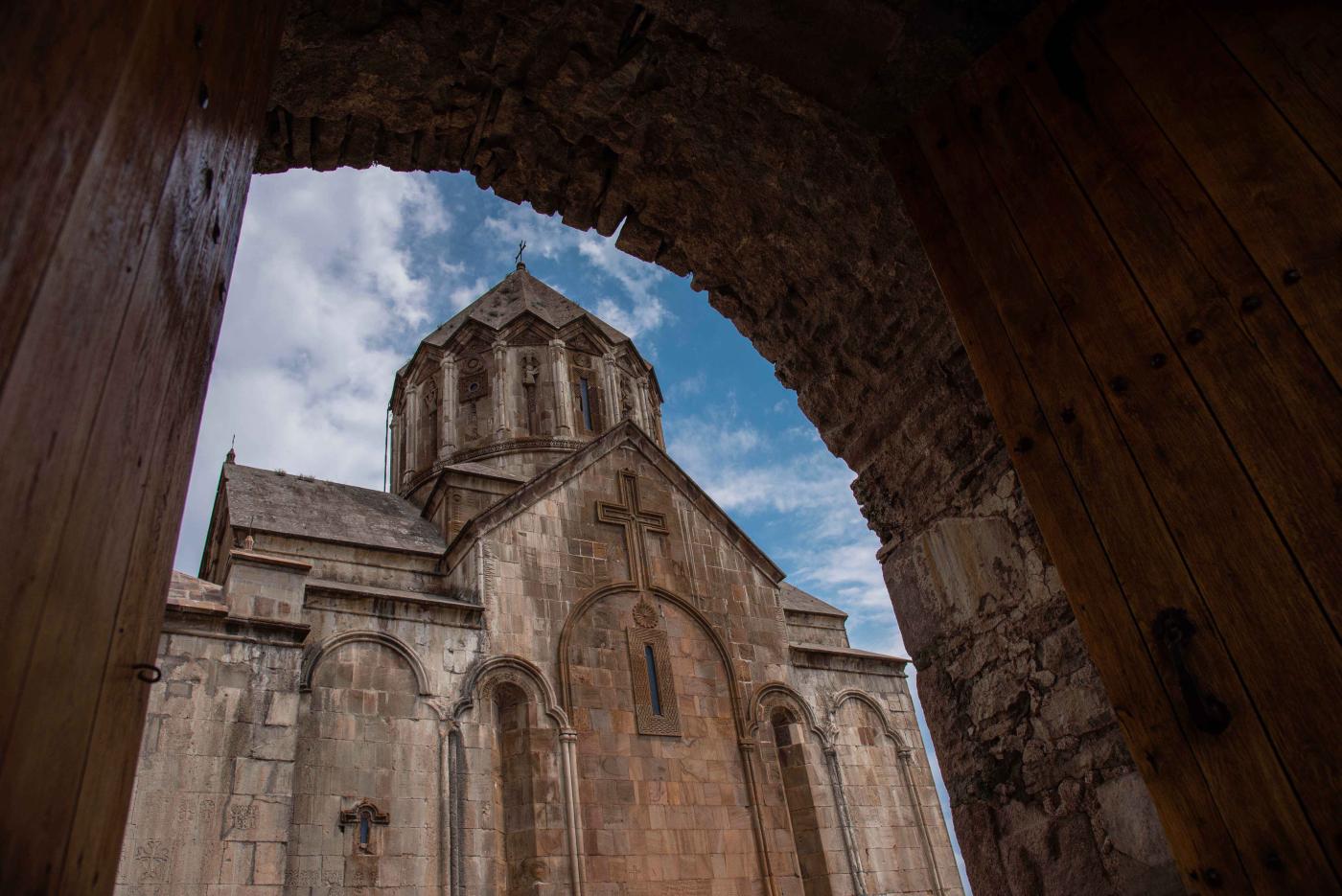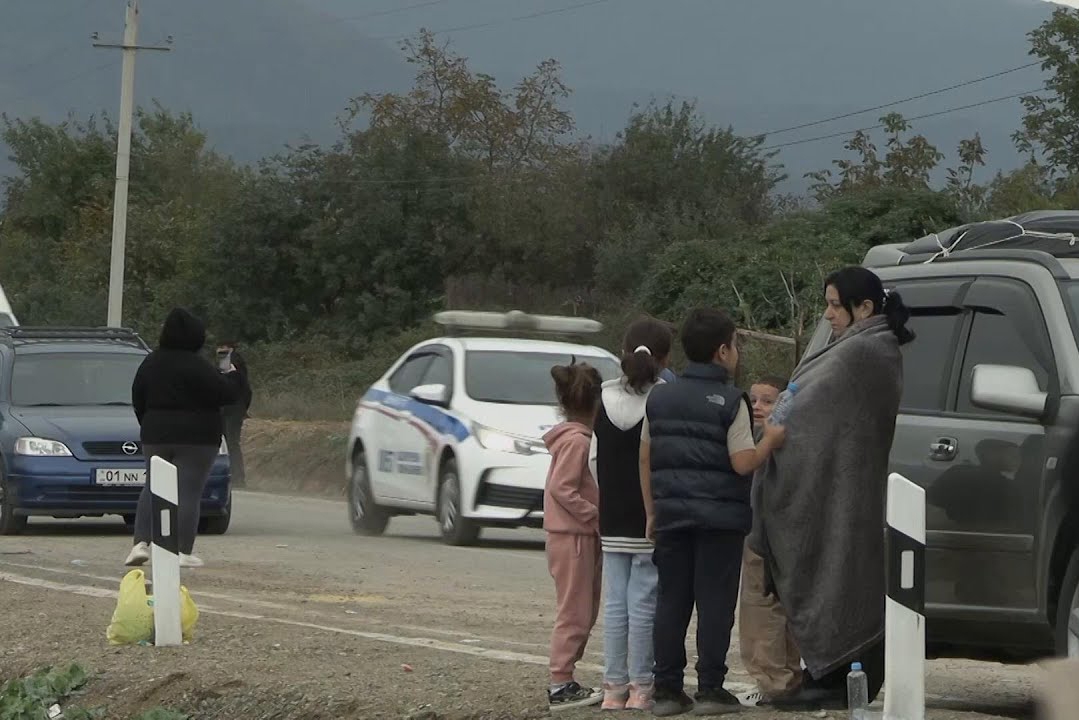The possibility of return seems like a distant dream.
Bence X. Szechenyi, Ella Chakarian May 7, 2024
In some ways, Caldwell, Idaho, reminds Shushanik Hayriyan of Sighnag, her village in Nagorno-Karabakh. The open fields and clear skies are reminiscent of the vistas on her family’s farm, some 6,000 miles away. Hayriyan was named after the highlands of Shusha where her parents met, a city now under Azerbaijani control following the Second Nagorno-Karabakh War.
Of the over 100,000 Karabakh Armenians forced to flee to Armenia last September, Hayriyan is one of thousands who managed to migrate onwards. While she pursues higher education in the United States, she tries not to be pessimistic about her homeland’s future. She believes the possibility of her family returning to their homeland is slim, but she will never say that to her parents. They still dream of everything returning to pre-war days.
“I know it’s such a big stress for him [her father] because he built everything, his own business and houses and all this property and everything,” said Hayriyan. “In a week, you lose everything. It is not easy to talk about it because people are just in shock.”
The United Nations International Court of Justice has ruled that Azerbaijan must allow refugees to return if they so desire. And while authorities in Armenia and Azerbaijan, as well as international institutions, acknowledge the right to return, 80 percent of Armenian refugees do not believe that this will ever happen, according to Gegham Stepanyan, who served as the human rights ombudsman of the de facto Nagorno-KarabakhRepublic, which ceased to exist at the end of 2023.
Stepanyan added that while the main source of hope for refugees is the chance to return, the sense of safety required to do so feels distant to many. Refugees are thus confronted with unsettling options at present: they can stay in Armenia, where it has proven difficult for many to adapt to new surroundings; or they can migrate onwards, likely shutting the door to any possibility of return.
Life in Armenia has been a difficult adjustment for refugees. Stepanyan said that despite being ethnic Armenians, refugees from Karabakh like himself have “different cultural peculiarities, for example, our dialect, our cuisine.”
Yerevan-based human rights lawyer, Siranush Sahakyan, who has been working with refugees, said that the idea of returning to Karabakh feels impossible to many because of “security concerns.” Those fears are rooted in still vivid “memories from the nineties” of atrocities committed during the first Karabakh war. To enable their return, refugees want comprehensive security guarantees, including an “international presence, and not only peacekeepers but also opening field operations of human rights organizations,” Sahakyan said. They also desire autonomy to handle their own local affairs, including the ability to maintain communities “mainly populated with Armenians,” added Sahakyan.
Armenia was the natural destination for Karabakh refugees, yet many new arrivals, especially those with no family members previously living in Armenia, have struggled financially, contending with an inadequate support system, minimal job opportunities, and inflated rents. A significant number are impoverished and itinerant.
The state budget is stretched thin and cannot cover the gaps for refugees, some aid workers contend. “Refugees right now can only rely on NGOs and non-state actors,” said Sirina Hajjar-Bakunts, an aid worker with All For Armenia.
Many refugees have been drawn to the Armenian capital Yerevan, but that is where it is perhaps toughest for them to fit in. Jobs are not plentiful and the cost of living is higher than in other parts of the country. Armenia has a 12 percent unemployment rate, with more than a quarter of the population living below the poverty line.
It is not much better in the countryside for refugees, many of whom were farmers before becoming displaced. Hajjar-Bakunts said many refugees believe the quality of soil in Armenia is worse for agricultural purposes than in Karabakh. They also complain about a lack of access to sufficient arable land.
“A lot of people are moving because they can’t find jobs,” said Hasmik Burushyan, an aid worker based in Goris.
For those leaving Armenia, Russia is proving the prime destination, mainly due to its proximity and accessibility. Hajjar-Bakunts said her husband initially went to Russia in search of work following his family’s displacement in 2020. He ultimately returned to be close to his family.
From the viewpoint of Stepanyan, the former ombudsman, refugees must remain in Armenia to preserve any chance of return to Karabakh. “I think that if they leave Armenia, it means that they also give away their right to return,” he said. The priority should be incentivizing refugees to remain in Armenia. “If we manage to keep everyone here in Armenia, it will give us the chance of a possible return,” he said.
Bence X. Szechenyi is a journalist based in New York City and a current M.S. Candidate at Columbia Journalism School. Follow him on Twitter and Instagram @bencexavier.
Ella Chakarian is a journalist based in New York City and a current M.S. Candidate at Columbia Journalism School. Follow her on Twitter @ellachakarian.
Eurasianet




